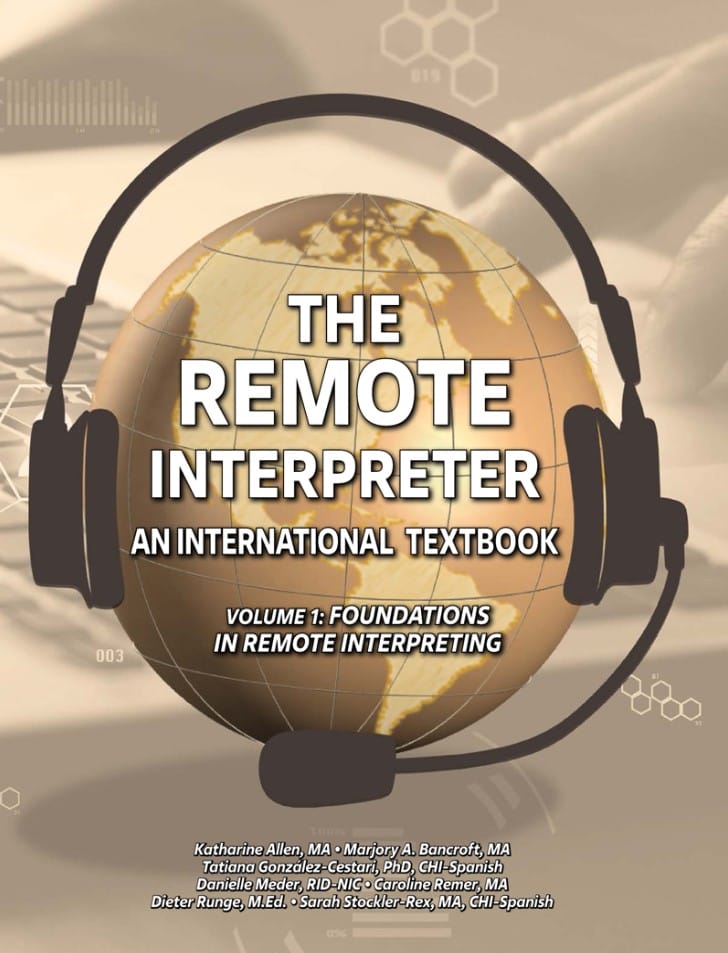
$120.00
Authors: Katharine Allen, MA; Marjory A. Bancroft, MA; Tatiana González-Cestari, PhD, CHI-Spanish; Danielle Meder, RID-NIC; Caroline Remer, MA; Dieter Runge, M.Ed; Sarah Stockler-Rex, MA, CHI-Spanish
Year Published: 2024
Edition: 1st
Pages: 676
Publisher: Culture & Language Press
ISBN: 978-1-7332491-7-1
Ebook Version: Available here
Introducing the definitive international textbook for remote interpreting.
Written for individuals and organizations training and working anywhere in the world, this textbook offers a comprehensive introduction to remote interpreting. Drawing on the experience and expertise of seven authors who work in a wide variety of roles and disciplinary settings, this is a landmark work. The Remote Interpreter sets the international standard for remote interpreter education. It is an essential resource for educational institutions and professional training programs that teach remote interpreting.
This is the first of a two-volume endeavor. Volume 1 provides an overview of the field and guidelines for achieving a successful remote interpreting setup and practice, including ethical guidance and a wealth of activities. Volume 2 will address how to work in specific areas of the field, such as remote simultaneous interpreting, or relay and team interpreting.
The Remote Interpreter is written in English using the plain language principles of clear wording, structure and design, ensuring the reader can find the content quickly, understand it easily, and apply it efficiently. This approach is designed to meet the needs of an international audience whose native language may not be English.
This textbook is divided into ten chapters that include as clear, comprehensive, and up-to-date information as possible, along with relevant exercises and activities. The following is the structure of this volume:
Volume 1
Foundations in Remote Interpreting
Important Advisory
Guidance about the limitations of this book.
Two Checklists for Remote Interpreters
Checklist 1: Prepare for Remote Interpreting
Checklist 2: Setup and Tech Check for Remote Interpreters
Preface
Why and how this book was written.
Remote Interpreting and the COVID-19 Pandemic
How the pandemic transformed interpreting and established remote interpreting as an essential service.
Introduction
The purpose, focus and structure of this book.
Glossary
A glossary of essential terms in remote interpreting.
Chapter 1 An Overview of Remote Interpreting
An introduction to the field, including OPI, VRI, VRS and RSI.
Chapter 2 Remote Interpreting Technology
A brief history of the recent evolution of relevant technology and what interpreters need to know to function effectively on remote interpreting platforms.
Chapter 3 Set Yourself Up to Perform Remote Interpreting
How interpreters can set up for a career in remote interpreting–and for each individual session.
Chapter 4 Essential Protocols and Skills
How to adapt interpreting modes, skills and protocols to remote environments.
Chapter 5 Remote Interpreter Evaluation
An overview of a two-part tool to help remote interpreters evaluate their own performance (self-evaluation) and the performance of their peers and colleagues (through peer feedback).
Chapter 6 A Guide to Ethics in Remote Interpreting
An international review of ethics and standards for interpreters around the world and a guide to addressing ethical requirements while interpreting across specializations and national borders.
Chapter 7 Addressing Communication Breakdowns
An international perspective on how remote interpreters may address breakdowns in communication that includes easy-to-use strategies for intervening briefly and effectively.
Chapter 8 Professionalism in Remote Interpreting
How interpreters can demonstrate consummate professional conduct in remote environments.
Chapter 9 Language Access Laws and Language Policies
A brief international perspective on how important laws and legal requirements in some countries have helped to spur the growth of remote interpreting and what remote interpreters need to know about these requirements.
Chapter 10 Portfolios for Remote Interpreters
Strategies for interpreters to obtain relevant credentials to enhance their work opportunities.
Activities Answer Key
Suggested answers (subjective in some cases) for chapter activities and exercises.
Bibliography
Up-to-date references of the works that have informed this book, including cited codes of ethics, which are a subset of the more than 200 codes reviewed initially. Thus, this bibliography provides a unique resource to the profession with comprehensive guidance on how to address concerns and requirements regardless of the country where professionals work.
The Remote Interpreter Evaluation Tool
A two-part tool to be used in conjunction with the content of Chapter 5 for remote interpreter self-evaluation and peer evaluation, with scorecards.
Intersect is our weekly e-newsletter with breaking news on language, culture and interpreting. Join 20,000+ subscribers in over 100 countries!